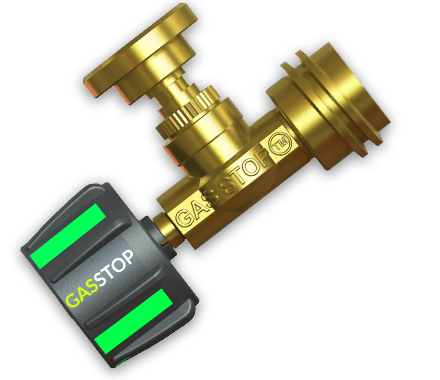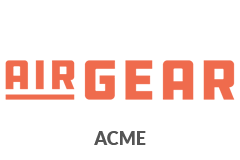
https://www.rvtravel.com/rv-gadget-testing-gasstop-gas-safety-device/
I’m a big proponent of safety stuff, and an even bigger fan of things when they’re simple. Stuff that makes our RV life safer and better that’s also a simple solution scores big in my book. That’s the GasStop, a simple way to prevent a gas leak. But there’s more.
I bought a GasStop at the FMCA Convention in Gillette, Wyoming. The GasStop is a simple device that you put in between your RV’s portable propane tank and the regulator. It’s an easy installation. Just unscrew the tank from the regulator, screw in the GasStop, screw the regulator’s hose on and you’re done, son.
How the GasStop works
Essentially the device works very simply. There’s a ball bearing inside the GasStop. When you turn on your propane tank, you push down on the dial on the top of the GasStop device, which pushes the little ball down inside the GasStop. The regular flow of propane then keeps the little ball suspended, allowing gas to flow normally.
If there is ever a leak, the ball is forced upward against the opening, shutting off the flow of gas. Simple. Essentially, even the normal flow of gas with all your devices running shouldn’t be enough to shut off the flow of propane – but a leak in the lines is.
Let’s talk a scenario which I’ve seen firsthand. You’re driving down the road with the gas-electric refrigerator running (shame, shame). Your tire blows and cuts the gas line your RV’s manufacturer so “wisely” put in the wheel well. Now you have a spark and enough gas to make sure your RV is nice and flaming so that all the local fire department has to do when they show up is direct traffic and mop up the remains of the rig.
The GasStop would have stopped the flow of propane in that circumstance.
A gauge estimates level of gas in the tank
The GasStop also has a gauge on top that estimates the level of gas in the tank, enabling you to keep an eye on things to avoid running out of propane. I would call this gauge reasonably accurate.
I spend a lot of time on LinkedIn and share some of these articles, including what I wrote about the FMCA Convention where I mentioned having purchased the GasStop. The U.S. distributor reached out to me to ask how I liked it. I reported that I did, but that it was difficult to put the plastic cover over the propane bottles.
I never looked at the company’s website, but they sell the GasStop device itself as well as right-angle propane connectors to replace the ones that came with my propane regulator. So they sent two of these (one for each tank) as well as a second GasStop for me to tell you about.
You can check your gas lines for leaks with the GasStop
One of the benefits of the GasStop is that, by using the propane gauge on top, you can actually try out your gas lines for leaks. Essentially, you activate the GasStop by pushing on the top and then shut off your gas. The system is supposed to maintain pressure in the lines.
If you find that the pressure decreases as indicated on the GasStop device on top, you have a leak.
This came in super handy since I just bought a 1970 Aristocrat Land Liner and, of course, still have my modern travel trailer. I wanted to see if the gas system leaked in the Aristocrat. So I installed the GasStop and a propane tank on it, pressurized the system, and then shut off the tank.
After three days it was still pressurized, indicating that the system was not leaking. Score!
Of course this is also good information to have on a modern RV as well.
I’m as big a cheapskate as anybody, but I did buy the GasStop as I also feel that safety stuff is just worth having. Frankly, the GasStop should be standard equipment, especially since some RV manufacturers run flexible propane lines right by the tires of an RV and then install cheap MayPop tires.
The side benefits of having some indication of how full the tanks are and being able to check for leaks just reinforce why I like this gizmo.
##RVT1015

Get your GasStop today
GasStop is available to buy at the online and physical stores shown below.
Get the correct type: POL for motorhomes — ACME for 5th wheels and trailers.










